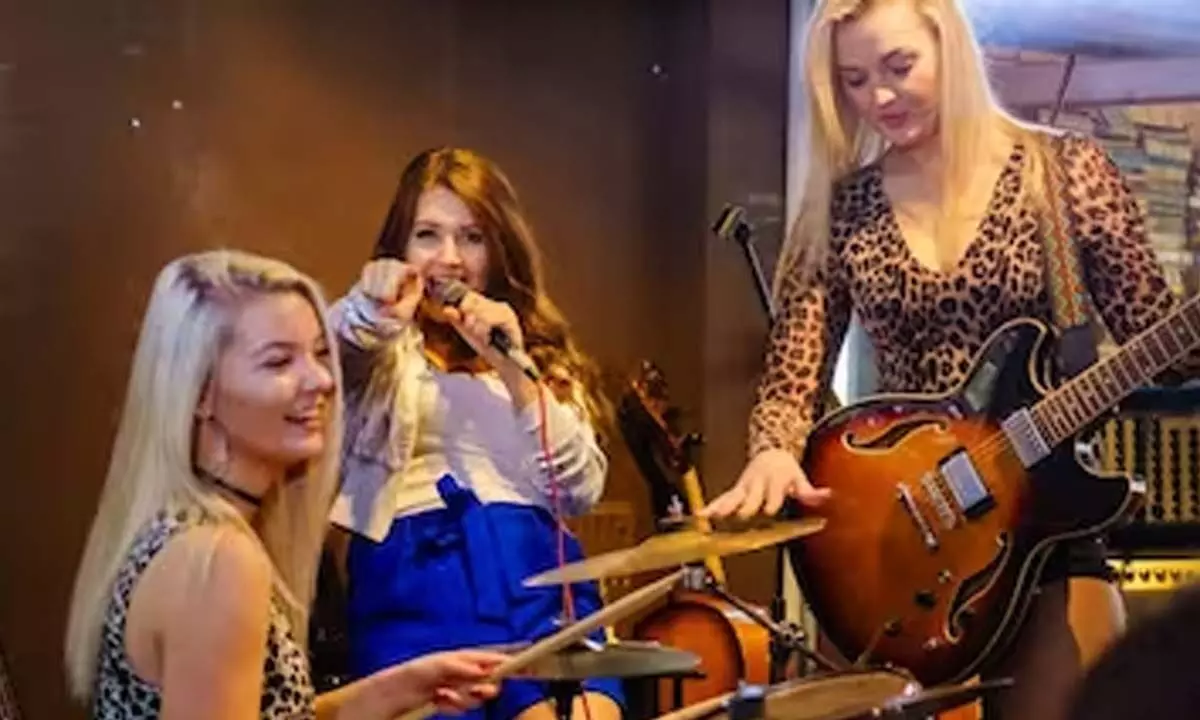Live
- Football: Trio leave Spain squad, Barrios gets call-up for Nations League clash with Swiss
- Dragon boat races during water festival in Cambodia ends with award ceremony
- Manipur bodies recovery: Widespread mob violence reported, curfew imposed, mobile internet suspended
- WPGT 2024: Hitaashee doubles lead to six shots in 14th Leg; Nayanika Sanga, Vidhatri Urs in pursuit
- Despite ideological differences, Cong has highest respect for Balasaheb Thackeray: Priyanka Gandhi
- Waqf row: BJP to stage protests before DC offices across Karnataka
- Disinformation major challenge, says Pak army chief after drawing flak on social media
- Digital media platforms must curb fake news, safeguard democracy: Ashwini Vaishnaw
- BJP wants to form govt in Jharkhand to loot its natural resources: Kharge
- Germany's healthcare sector hit by skilled labour shortages
Just In
Women Rock Day 2024 Date, History, and 5 All-Female Rock Bands


Rock music has always been synonymous with rebellion, energy, and a fearless spirit.
Introduction: Rock music has always been synonymous with rebellion, energy, and a fearless spirit. While the genre has been traditionally dominated by male voices, Women Rock Day stands as a testament to the powerful and influential women who have carved their niche in the world of rock. This article explores the significance of Women Rock Day, its history, and showcases five incredible all-female rock bands that continue to break barriers.
Date and Significance of Women Rock Day:
Women Rock Day is celebrated annually on January 20th, serving as a platform to recognize and honor the contributions of women to the rock music genre. The day encourages the appreciation of female musicians, bands, and their impact on shaping the diverse landscape of rock and roll. It is a celebration of empowerment, resilience, and the breaking of stereotypes in the world of music.
History of Women Rock Day:
The roots of Women Rock Day can be traced back to the need for greater recognition of women in the rock genre. Historically, female musicians faced challenges in gaining acceptance and respect in what was perceived as a male-dominated industry. Women Rock Day emerged as a response to this, aiming to amplify the voices of talented women who have defied norms and made significant contributions to the evolution of rock music.
5 All-Female Rock Bands
1. The Runaways: Kicking off the list is The Runaways, a trailblazing all-female rock band formed in the mid-1970s. With members like Joan Jett, Cherie Currie, and Lita Ford, The Runaways made history by challenging gender norms and delivering a rebellious sound. Their hit songs, including "Cherry Bomb," became anthems for a generation, proving that women could not only rock but also dominate the stage with unapologetic attitude and talent.
2. L7: Known for their grunge and punk-infused sound, L7 emerged in the late 1980s and gained prominence throughout the '90s. The band, comprising Suzi Gardner, Donita Sparks, Dee Plakas, and Jennifer Finch, brought a fierce and raw energy to their performances. L7's unfiltered approach to music challenged the stereotypes associated with women in rock, solidifying their place as influential pioneers in the alternative rock scene.
3. The Donnas: Hailing from California, The Donnas burst onto the scene in the early 1990s, infusing punk and garage rock into their sound. Comprising Donna A., Donna R., Donna F., and Donna C., the band embraced a rebellious and carefree attitude, challenging the notion that rock was a male-dominated genre. Hits like "Take It Off" and "Fall Behind Me" showcased The Donnas' infectious energy and undeniable talent.
4. The Vinyl Records: Stepping into the contemporary scene, The Vinyl Records are an all-female rock band from India. Comprising Banu, Minam, Mithy, and Cheyyrian Bark, the band blends indie, punk, and rock elements to create a unique sonic experience. Breaking cultural barriers, The Vinyl Records are at the forefront of the global movement showcasing the diverse and powerful voices of women in rock.
5. Fanny: Pioneers in the early 1970s, Fanny was one of the first all-female rock bands to achieve commercial success. Consisting of June Millington, Jean Millington, Alice de Buhr, and Nickey Barclay, Fanny challenged stereotypes and paved the way for future generations of women in rock. Their bluesy rock sound and instrumental prowess left an indelible mark on the music industry, proving that gender is no barrier to musical excellence.
These five all-female rock bands, from The Runaways to The Vinyl Records, have each played a crucial role in challenging stereotypes and pushing the boundaries of what it means to be a woman in rock. Their influence is not only felt in the music they created but also in the doors they opened for future generations of female musicians. As we celebrate these trailblazers, let's also acknowledge the ongoing journey towards a more inclusive and diverse rock music landscape.

© 2024 Hyderabad Media House Limited/The Hans India. All rights reserved. Powered by hocalwire.com






